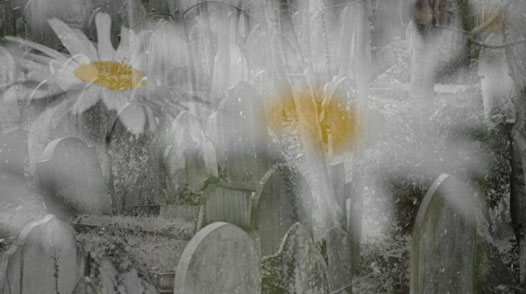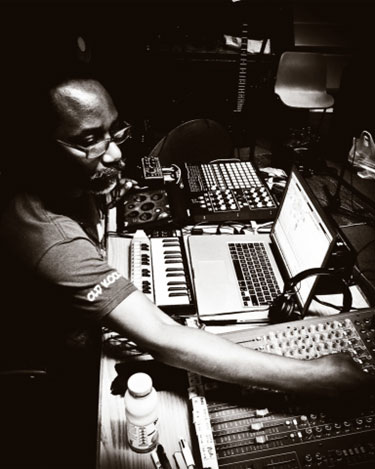
The Conversation Continues: We Are Still Listening is a 40-minute immersive soundscape from artist Trevor Mathison that offers a re-examination of the lives and histories of those laid to rest at the cemetery in the context of contemporary anti-racism movements, honouring Stuart Hall’s memory and his ongoing impact on contemporary national debates. Audiences are invited to listen to the soundscape on headphones as they follow their own pathway through Highgate Cemetery’s beautifully conserved landscape of monuments, buildings, flora and fauna.
Trevor Mathison developed The Conversation Continues: We Are Still Listening by exploring the legacy of Stuart Hall (1932 – 2014) and his arrival in the UK from Jamaica in 1951 and taking a historical look at Highgate Cemetery: how it came into being, the radical thinkers buried there, and its botanical meditative landscape. The piece imagines those that are resting – philosophers, artists, writers from different periods – coming together to expand on their lives’ work and debate with each other. Mathison has incorporated field recordings from the Highgate Cemetery and its surrounding areas, as well as audio extracts from Stuart Hall’s 2004 lecture ‘Through the Prism of Intellectual Life’ and text from Hall’s posthumous memoir Familiar Stranger spoken by actor Joseph Black. In addition, extracts from Selina Nwulu’s poetry have been woven into the piece.
‘I am fascinated by the number of individuals buried in the cemetery who have contributed so greatly to our own realities and in various different ways; from scientists, philosophers, writers, painters, academics and many more. First among them for me, is Stuart Hall who was one of the most important social and cultural thinkers of our time. I feel the need to keep them close, to acknowledge their work and think about how their ideas and questions continue on through our own present-day debates. I have also been drawn to the plants that grow alongside the graves in Highgate Cemetery, imagining how voices might permeate, connect and continue to flourish through the rich layers of its natural landscape. My hope is that the soundscape provides a meditative space for the listener to relate back to the cemetery, reflect on Stuart Hall’s legacy and in this way, to consider the community and dialogue resting there, with all its multiple, active connections that we are being invited into.’
– Trevor Mathison
STUART AND HIGHGATE CEMETERY
Professor Stuart Hall was a member of the ‘Windrush Generation’ who arrived in Britain from Jamaica in 1951. He became a leading figure in Britain’s radical tradition, whose work transformed the nature of public conversations around culture, race, and identity at a pivotal time of immigration and social change. He was a prolific writer and a deeply committed teacher with a firm belief in collaborative projects, a desire to communicate and an expansive range of interests which continue to have vitality and relevance to those hoping and working for change.
Unlike many of the Windrush generation, Stuart did not wish to return ‘home’ to Jamaica on his death. Despite a long and uneasy relationship to belonging in Britain, he imagined he would be in good company at Highgate Cemetery, settled amongst a community of Left intellectuals – Karl Marx, Eric Hobsbawm, Raphael Samuel, Claudia Jones – and close enough to his North West London home for it to feel familiar. Here, he is settled, in the company of friends and others who have contributed in critical and imaginative ways to Britain’s cultural and political landscape. Like many visitors to the Highgate Cemetery, Stuart Hall’s family and friends have developed a living relationship with the site which resonates with the Foundation’s interest in bringing the past, present and future into a meaningful dialogue with one another.

Trevor Mathison is an artist, musician, composer, sound designer and recordist. His sonic practice – centred on creating fractured haunting aural landscapes and integrating existing music – has featured in over thirty award-winning films. Trevor was a founding member of the cine-cultural artist collective: The Black Audio Film Collective (BAFC, 1982 -1998), where his sonic designs defined and situated the Collective’s film and gallery installations, including Signs of Empire, Handsworth Songs and The Last Angel of History.
Mathison has continued to work with some of his former collaborators from BAFC (John Akomfrah, Lina Gopaul and David Lawson) creating sound design for installations and feature documentaries, including Mnemosyne, The Unfinished Conversation, Peripeteia, The Stuart Hall Project and The Nine Muses. Recent compositional scores feature in John Akomfrah’s and Dredd ScoXs’ Slave Rebellion Re-enactment 2019 and Garret Bradley’s award-winning feature America 2019.
Mathison has also founded and been active in a number of other experimental sonic groups – Dubmorphology, Hallucinator and Flow Motion. Dubmorphology is a production and performance group with fellow media artist, Gary Stewart which conceptualises, produces and performs sonic and visual events – site specific installations and large-scale ambient scores that have formed the basis for moving image works. His most recent work with Dubmorphology, Colony, 2021, was commissioned for UnNatural Histories as part of Coventry Biennial.
Mathison has also been a pioneer of sound installation work. In 2020 at CAPC in Bordeaux, he was commissioned to make a sonic response to Lubaina Himid’s installation Naming the Money. His most recent sound performance was for the African Digital Innovation Festival 2021, a live-streamed sonic event between London and Johannesburg South Africa. It comprised a digital sound clash between electronic musicians.
The Conversation Continues: We Are Still Listening was commissioned by the Stuart Hall Foundation in partnership with Highgate Cemetery and LUX, and with funding from Arts Council England and The Elephant Trust.
For more information, visit the Stuart Hall Foundation website: https://www.stuarthallfoundation.org/…
